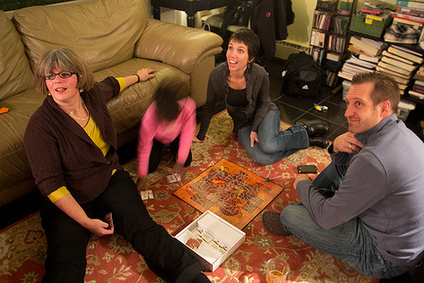5 Tips for Being Yourself Around Your Family
by Jordan Myska Allen, a lover of life and entrepreneur. He acts as a psychological, spiritual, and professional consultant and practices applied integral thinking.
“A Democrat, a Republican, and a Libertarian walk into a bar…” Is this the beginning of a bad joke, or just a description of a holiday season family gathering? Let’s face it, our families sometimes bring out the worst in us. The result can be a stressful holiday season.
There seems to be a gravitational pull that puts us back into the role we played in much less developed times in our life, especially around our parents and siblings. For example: In my adult life I often play the role of leader, but when I get back into my family system I tend to abdicate any sort of responsibility, organizing, or decision making. I am the youngest in my family of four, so I often unconsciously slip back into my old way of being the youngest.
We can sit around and analyze the causes for this all day, but such knowledge will not necessarily help us be the person we want to be around the people we love the most. A better use of our energy would be to ask ourselves “Who do I want to be around my family? How do I want to see and treat them, and how do I want them to see and treat me?”
Then we can commit to be aware of our tendency to slip back into old patterns. If these patterns serve who we want to be, great! Keep them. But if they do not, this new awareness gives you the opportunity to choose to a new way of being.
How will you choose a new way of being? Try out the following internal commitments, and ask a trusted family member to gently remind you when you lose center.
1. Make a Commitment to Not Play Your Usual Part.
Our habitual way of being in our family system is often a less developed and less loving version of ourselves. Whereas we might be easy going with our friends, we are quick to anger with our sister or brother. Whereas we are always on time at work, we are always late around the family. Committing to be different is the first step to being who you want to be around your family. Unless you like your usual role.
2. Commit to Humility.
If you declare yourself to be invulnerable, the first thing people are going to do is look for chinks in your armor. So if you declare yourself “right,” most people’s natural inclination will be to point out all the ways you are wrong. If you strive for strife in your family gatherings, by all means try to prove that you are right, that you know truths no one else does. If you want a fun, deep interaction with people you love, then check your attachment to being right—you often are not.
3. Strive to be an Active Observer.
When you take a position on something in a discussion, you are unconsciously prioritizing that position over the relationship. Holding that position becomes more important than the connection between you and someone who holds a different position. Why is it so important? What self-identity is more valuable than communion with your family?
Instead of getting caught up in what is going on, strive to be an active observer. Like a passive observer, you aim for neutrality, yet you actively engage in the conversation. You share your experiences and opinions (a first person perspective), but you hold them lightly, knowing their fragility. You ask clarifying questions (a second person perspective) and expand discussions to include a larger context (a third person perspective). [instant intimacy with anyone link]
Active observation does not mean detachment. Detachment is an attitude that “anything goes.” This is more likely to engender fear than love. The kind of observation that will help you express the best of who you are around the people you care most about is a growing awareness of your own thoughts, feelings, and habitual stories as they arise in the context of relationship. When you become aware of these things, they no longer define who you are. As a result, whatever happens is not a cause for upset.
4. Raise Awareness about What’s Really Going On.
When discussions get heated they are usually dancing around the real issues. These deeper issues can be old wounds—competitions from childhood, fears of not being loved, enough, or adequate, or current stresses—money problems, power struggles at work, or marital issues. Although these hot button topics may still be too raw to address directly, and your family system may not be the kind that welcomes confrontation, opening your own awareness to them will help you act with more grace and compassion.
This will also support and be supported by the previous commitments to playing a new role, remaining humble, and striving to be an active observer.
5. Take Care of Yourself.
Make to sure to eat well, work out, and get a full night’s rest, even if that means politely turning down some homemade treats and taking time away from the family. There are many ways the holiday season puts us out of whack, and committing to take care of yourself—ideally to maintain your Integral Life Practice—will help make the time you do get to spend together more meaningful.
Bonus: Treat Yourself with Kindness
Try not to be beat yourself up if you do not maintain these commitments, as that would be going against the point. Repression often leads to the “you create what you resist” phenomena. Remember that there will be endless opportunities to be “drawn back in.” Have patience. Instead of judging yourself for falling into old habits you do not want, use that moment to re-commit yourself to what you do want.

